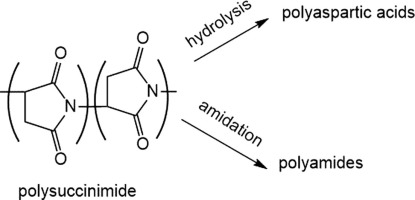当前位置:
X-MOL 学术
›
Eur. Polym. J.
›
论文详情
Our official English website, www.x-mol.net, welcomes your
feedback! (Note: you will need to create a separate account there.)
Polysuccinimide and Its Derivatives: Degradable and Water Soluble Polymers (Review)
European Polymer Journal ( IF 5.8 ) Pub Date : 2018-12-01 , DOI: 10.1016/j.eurpolymj.2018.08.056 Esmat Jalalvandi , Amin Shavandi
European Polymer Journal ( IF 5.8 ) Pub Date : 2018-12-01 , DOI: 10.1016/j.eurpolymj.2018.08.056 Esmat Jalalvandi , Amin Shavandi

|
Abstract Interest for water soluble polymers which show biocompatibility and degradability is growing due to their potential applications in medical sciences. Polysuccinimide (PSI), commonly synthesized through thermal polymerization, is a polyimide precursor for the production of such biocompatible and degradable polymers namely polyaspartic acid and various polyaspartamides. Polyaspartic acid is usually obtained by hydrolysis of PSI while polyaspartamide is produced by ring opening of PSI using a nucleophilic reagent. The presence of amide linkages in these polymers gives them peptide-like structures which is prone to hydrolysis and subsequent degradation. These derivatives could be potential substitutes for different polyamino acids in many medical applications. This review compiles the works carried out on developing polysuccinimide and its derivatives as well as the main synthetic routs and characterization methods.
中文翻译:

聚琥珀酰亚胺及其衍生物:可降解和水溶性聚合物(综述)
摘要 由于水溶性聚合物在医学科学中的潜在应用,对具有生物相容性和可降解性的水溶性聚合物的兴趣正在增长。通常通过热聚合合成的聚琥珀酰亚胺 (PSI) 是一种聚酰亚胺前体,用于生产此类生物相容性和可降解聚合物,即聚天冬氨酸和各种聚天冬酰胺。聚天冬氨酸通常是通过 PSI 水解获得的,而聚天冬酰胺是通过使用亲核试剂的 PSI 开环来生产的。这些聚合物中酰胺键的存在使它们具有易于水解和随后降解的肽样结构。在许多医学应用中,这些衍生物可能是不同聚氨基酸的潜在替代品。
更新日期:2018-12-01
中文翻译:

聚琥珀酰亚胺及其衍生物:可降解和水溶性聚合物(综述)
摘要 由于水溶性聚合物在医学科学中的潜在应用,对具有生物相容性和可降解性的水溶性聚合物的兴趣正在增长。通常通过热聚合合成的聚琥珀酰亚胺 (PSI) 是一种聚酰亚胺前体,用于生产此类生物相容性和可降解聚合物,即聚天冬氨酸和各种聚天冬酰胺。聚天冬氨酸通常是通过 PSI 水解获得的,而聚天冬酰胺是通过使用亲核试剂的 PSI 开环来生产的。这些聚合物中酰胺键的存在使它们具有易于水解和随后降解的肽样结构。在许多医学应用中,这些衍生物可能是不同聚氨基酸的潜在替代品。











































 京公网安备 11010802027423号
京公网安备 11010802027423号